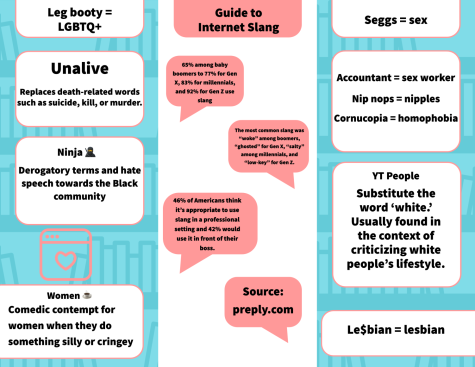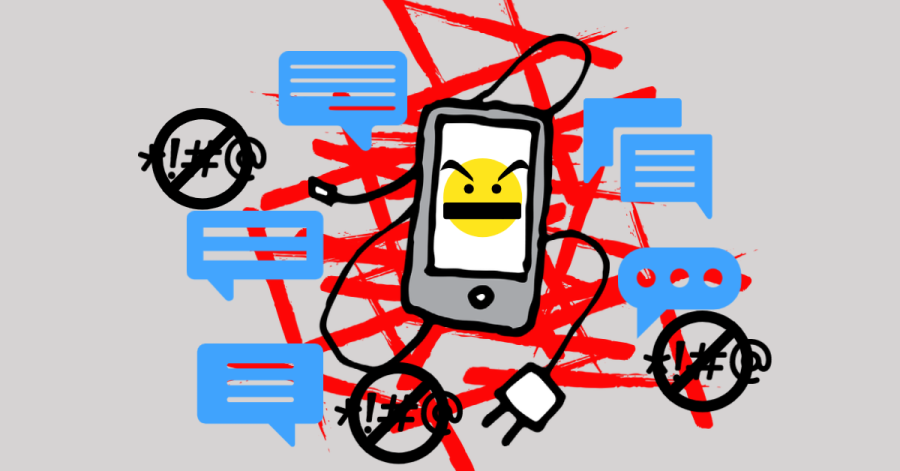Unalive censorship
User Notice: the algorithm is working against you. Sooner or later, the Internet will have accomplished brainwashing the entire human population, making us unable to take each other seriously.
The control over our use of language on the internet may have started as a joke but is leading to the desensitization of our generation to severe topics.
Progress is only made by those who open their minds to it. One of the benefits of the widespread use of social media is how much easier it has become to share new ideas with the rest of the world. The internet may be vast and constantly evolving but still considered a close-knit community by its residents. It doesn’t take much to sway minds when they’re all joined together, like in the online world. But that doesn’t mean they aren’t stubborn; risk having one wrong opinion (milk before cereal, social studies is red, or any grammar mistake ever), and you’ll be dragged to your own public execution. Mass hysteria, indeed. Even with the protection of a digital persona, one is still forced to conform to the culture or face humiliation.
So naturally, with almost nonexistent reigns in this almost dystopian-like community, the algorithm finds a more underhanded way to take control. When the purpose of a product is to give people attention, it is no surprise when said people will do anything to earn it. In order to achieve compliance without establishing set rules, the algorithm uses the user’s own content against them. Every influencer’s worst nightmare: shadow banning. Driven by the fear of possibly yelling into nothing but an empty void, shadow banning assures that those who post content to social media platforms follow the community guidelines and keep themselves in check.
Content that includes any signs of profanity, graphic violence, nudity, or overall not age-appropriate is a surefire way to let no one ever see your content. The issue is, however, other than the obvious, social media such as Instagram or TikTok doesn’t specify what kind of content will or will not be tolerated. Whatever the limitations are, it certainly has done nothing to prevent all of the toxicity going around the internet as of this moment. The death threats, hate comments, and degrading posts don’t seem to be going away anytime soon, no matter how many times you press the block button. So if social media doesn’t stop this kind of behavior online, just what are they preventing? The answer is right on your screen. Look closely, or more accurately, listen carefully. Every influencer you follow, every reel that catches your attention, what are they telling you? How are they communicating with the rest of the world?
With each new generation comes a wave of “lingo” which only those with a nuanced understanding of the current youth are able to interpret. Grammar and formal English are thrown out the window when it comes to integrating yourself into the culture of slang. Almost like a second language, you speak it fluently for a decade or so before you realize that within that timespan, your vocabulary has become outdated and irrelevant, and no one understands what you’re saying anymore. Short attention spans will be the bane of our youth as trends come and go; it feels impossible to stay current.

Speaking of current, our recent generation’s version of slang comes with its own title. Algospeak refers to the practice of trying to evade using the algorithm’s banned terms and getting shadow-banned by speaking in code words instead. Now people refer to topics like suicide as “unalive” or spell sex as “seggs” and porn as “corn.” We speak with emoticons and acronyms to get our message across, and there’s no way to tell apart the sarcasm from the genuineness. Just because somebody puts the old white man emoji after a racist remark, doesn’t always mean it’s satire.
These code words might have started out as light-hearted humor in the beginning— an inside joke amongst netizens who felt cunning that they beat the system, and before we knew it, it became our new way of communicating with each. Formerly used ironically but, “bro, I don’t think it’s a joke anymore.” Using these expressions in everyday life is not uncommon now, not just limited to the online world. We might be quick to assume there’s no harm done, but language is a vital factor that influences our way of thinking.
It’s no coincidence that a good majority of banned terms from the algorithm, specifically on TikTok, are related to more than just what’s appropriate and what isn’t. The algorithm seems to flag topics that shouldn’t be deemed mature content at all, like sexual positivity or Black Lives Matter. “Leg booty” is code for LGBT, “le$bian” is a different spelling for lesbians, and “mascara” is just another way to refer to a romantic partner. None of these topics are offensive in any way, and yet we are still barred from using the actual words in casual conversation on many platforms. Even “white” is replaced by “yt” due to sensitivity. The hypocrisy is clear, especially considering just what kind of content is making its way through instead.
Social media is a place to be seen; it is your chance to become the center of attention by showing off who you want to be. Whether you’re being genuine or just faking it, people are always watching you, judging safely behind the comfort of their anonymity. The ability to leave yourself vulnerable for the entire world to see while hiding behind your screen is a luxury people think they can afford without realizing the true price.
The existence of the internet is a walking contradiction. Never has the human race been closer together yet further apart. A place with an endless depth of knowledge and thought-provoking discussions, as well as a breeding ground for surface-level superficial individuals trapped in this digital echo chamber of ideas. People exist in both unity and discord, where everybody is in the same boat yet determined to drown each other.
However, even without someone trying to push you off board, it’s already hard enough to keep yourself afloat, not when the system is working against you. In an age where your social media presence becomes a part of your identity, the algorithm controls your entire reputation.
The toxic environment social media creates by poisoning the mind is a horse that’s been beaten long past death. We’ve all read the articles, heard about the studies, and made fun of the warnings our parents gave us— we just don’t care anymore. It is a worn-out discussion in which the majority of takes place on, ironically enough, some Twitter thread or Tiktok reel. However, what cannot be denied is the powerful influence this digital utopia has on our modern society and how we treat each other. Despite how incessant the noises of the Internet can be, the most determined voices can always break through to start meaningful conversations that can manage to shift even the most stubborn lens. No matter how taboo a topic may be, social media has always been the place to voice opinions.
Social media tries to market itself as a space where people can freely express themselves, but they still try to control our conversations. There is no other way about it: it’s censorship. Our right to speech is being suppressed by those who consider certain ideals or worldviews offensive.
And it’s working. Slowly, our generation is becoming numb to important conversations. Suicide is a growing epidemic among youth, and yet stopping ourselves from even using the proper word is desensitizing us to discuss it. “Unalive” is treated more like a joke rather than proof that something’s wrong. We are so casual about throwing around words like “triggered” or “gaslighting” despite the heavy implication behind them. There’s also the obvious political state our country is in involving recent anti-LGBT agendas and trying to erase the community from the conversation. We laugh in self-pity, blind to our own brainwashing and not being able to tell apart the joke from reality /s. It’s 2023, but it feels like we’ve already reached the year 1984. It won’t be long before algospeak is really Newspeak in disguise.
No matter how difficult or uncomfortable a conversation may be, it’s still necessary to be able to speak of it in the open. Otherwise, how will we ever achieve progress? If social media wants to be as open-minded as it believes it is, then it has to step back and consider what exactly it is trying to do. Censorship isn’t the answer when it comes to preventing toxicity among communities. It’s about taking responsibility for the weight of our words.
Your donation will support the student journalists of West High School. Your contribution will allow us to purchase Scholarship Yearbooks, newsroom equipment and cover our annual website hosting costs.

(she/her) Nicole is a senior and in her third year on staff and second year as opinion editor. You can usually spot her walking down the hall wearing her...



